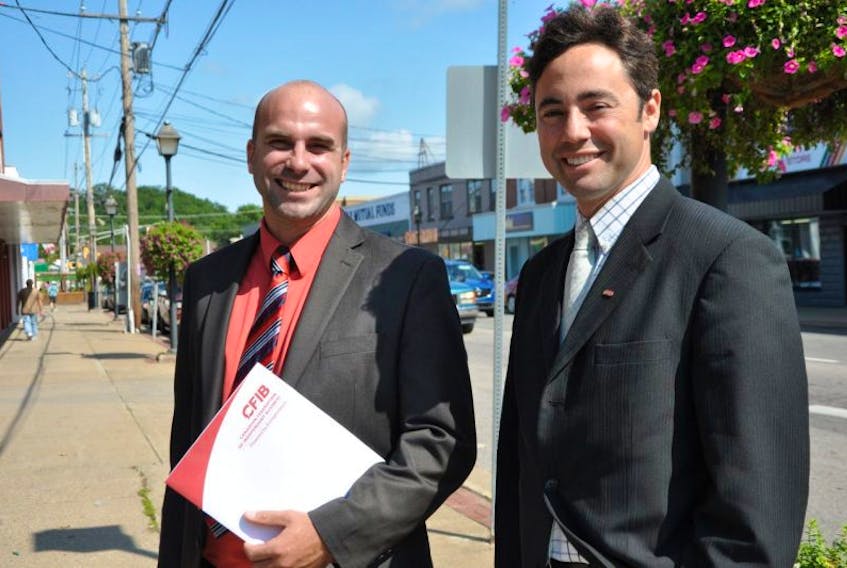But the Canadian Federation of Independent Business (CFIB) can’t inspire positive changes alone. CFIB needs feedback from small business owners and co-operation from all levels of government.
Nick Langley, CFIB’s director of provincial affairs, and Patrick Kelly, CFIB’s district manager for the Annapolis Valley, visited several Kentville area businesses recently, along with Kentville Mayor David Corkum, to learn more about the obstacles faced by local entrepreneurs.
The primary issued faced by Canadian entrepreneurs from coast to coast is taxation, Langley said.
“The tax burden is the number one issue our members point to.”
CFIB encourages municipal governments throughout the country to consider the tax gap between the residential and commercial rates, then think about what additional services, if any, come with paying more taxes for commercial properties.
“Small business is the backbone of our economy in Nova Scotia and in the Annapolis Valley. Where would Kentville be if it wasn’t for small businesses?” asked Langley.
The CFIB is pushing all levels of government to take steps to alleviate the tax burden felt by small business owners.
“The four national parties have all committed to reducing the small business tax rates from 11 per cent to nine per cent,” said Langley, listing an example of an ask the CFIB has made on the brink of the Oct. 19 federal election.
Provincially, CFIB is paying close attention to an Extended Producer Responsibility (EPR) program under consideration by Nova Scotia Environment.
“What it would mean for small businesses is that they would have to weigh, measure, record and forecast every aspect of packaging that they sell in their business,” said Langley, who noted that the clear bag and recycling programs are more likely to help the province meet waste diversion targets.
Several CFIB members in Nova Scotia are concerned about the added costs that come with the implementation of the EPR program, Langley said.
“These regulations were supposed to be enacted this fall but we pushed back and the government said we’re going to hit pause for a year,” said Langley.
Red tape, Langley said, is regulation that does not add value.
“What drives business owners crazy is the amount of overly burdensome regulation that they have to go through. They just want to focus on running their business and growing that business.”
In addition to wanting lower tax rates and less red tape, Kelly said small business owners throughout the Valley believe “having the community presentable for both customers and potential businesses coming to the area” is equally important.
Another take on EPR
Langley took his concerns about the proposed EPR solid waste management program Kentville town council Sept. 28.
Langley told council he is concerned small businesses would have to pay based on the weight of the packaging for products they sell, which is something entrepreneurs can’t control.
He added that many CFIB members have said they feel EPR would be the equivalent of another tax for small business owners.
Deputy mayor Mark Pearl, board chairman of Valley Waste Resource Management, said there were “some gaps” in CFIB’s “version of EPR, and our version that we’re proposing.”
As it stands, Pearl said landfill bans and the enforcement of waste diversion regulations are costly measures that target taxpayers instead of the manufacturers of product packaging.
“Nova Scotia has done well in waste management diversion – no question. But that has come at a significant cost to the taxpayer.”
EPR, Pearl said, is one way to entice manufacturers to revisit how products are packaged. It could also generate significant savings for municipalities, Pearl added.
Pearl said industry, environment and municipal representatives will congregate in Truro Oct. 23 to evaluate the pros and cons of the proposed EPR program.
Mayor Dave Corkum assured Langley the potential impact on small businesses will be thoroughly considered.
“I have a concern of whether this is going to cost small businesses a lot of money or not. That would be my focus, that is the (Union of Nova Scotia Municipality’s) focus, too.”
What he said:
“It is designed to target big business and make them design packaging with the environment in mind. That is achievable. It’s based on the premise that the polluter pays.” – Mark Pearl, board chairman Valley Waste Resource Management
But the Canadian Federation of Independent Business (CFIB) can’t inspire positive changes alone. CFIB needs feedback from small business owners and co-operation from all levels of government.
Nick Langley, CFIB’s director of provincial affairs, and Patrick Kelly, CFIB’s district manager for the Annapolis Valley, visited several Kentville area businesses recently, along with Kentville Mayor David Corkum, to learn more about the obstacles faced by local entrepreneurs.
The primary issued faced by Canadian entrepreneurs from coast to coast is taxation, Langley said.
“The tax burden is the number one issue our members point to.”
CFIB encourages municipal governments throughout the country to consider the tax gap between the residential and commercial rates, then think about what additional services, if any, come with paying more taxes for commercial properties.
“Small business is the backbone of our economy in Nova Scotia and in the Annapolis Valley. Where would Kentville be if it wasn’t for small businesses?” asked Langley.
The CFIB is pushing all levels of government to take steps to alleviate the tax burden felt by small business owners.
“The four national parties have all committed to reducing the small business tax rates from 11 per cent to nine per cent,” said Langley, listing an example of an ask the CFIB has made on the brink of the Oct. 19 federal election.
Provincially, CFIB is paying close attention to an Extended Producer Responsibility (EPR) program under consideration by Nova Scotia Environment.
“What it would mean for small businesses is that they would have to weigh, measure, record and forecast every aspect of packaging that they sell in their business,” said Langley, who noted that the clear bag and recycling programs are more likely to help the province meet waste diversion targets.
Several CFIB members in Nova Scotia are concerned about the added costs that come with the implementation of the EPR program, Langley said.
“These regulations were supposed to be enacted this fall but we pushed back and the government said we’re going to hit pause for a year,” said Langley.
Red tape, Langley said, is regulation that does not add value.
“What drives business owners crazy is the amount of overly burdensome regulation that they have to go through. They just want to focus on running their business and growing that business.”
In addition to wanting lower tax rates and less red tape, Kelly said small business owners throughout the Valley believe “having the community presentable for both customers and potential businesses coming to the area” is equally important.
Another take on EPR
Langley took his concerns about the proposed EPR solid waste management program Kentville town council Sept. 28.
Langley told council he is concerned small businesses would have to pay based on the weight of the packaging for products they sell, which is something entrepreneurs can’t control.
He added that many CFIB members have said they feel EPR would be the equivalent of another tax for small business owners.
Deputy mayor Mark Pearl, board chairman of Valley Waste Resource Management, said there were “some gaps” in CFIB’s “version of EPR, and our version that we’re proposing.”
As it stands, Pearl said landfill bans and the enforcement of waste diversion regulations are costly measures that target taxpayers instead of the manufacturers of product packaging.
“Nova Scotia has done well in waste management diversion – no question. But that has come at a significant cost to the taxpayer.”
EPR, Pearl said, is one way to entice manufacturers to revisit how products are packaged. It could also generate significant savings for municipalities, Pearl added.
Pearl said industry, environment and municipal representatives will congregate in Truro Oct. 23 to evaluate the pros and cons of the proposed EPR program.
Mayor Dave Corkum assured Langley the potential impact on small businesses will be thoroughly considered.
“I have a concern of whether this is going to cost small businesses a lot of money or not. That would be my focus, that is the (Union of Nova Scotia Municipality’s) focus, too.”
What he said:
“It is designed to target big business and make them design packaging with the environment in mind. That is achievable. It’s based on the premise that the polluter pays.” – Mark Pearl, board chairman Valley Waste Resource Management









